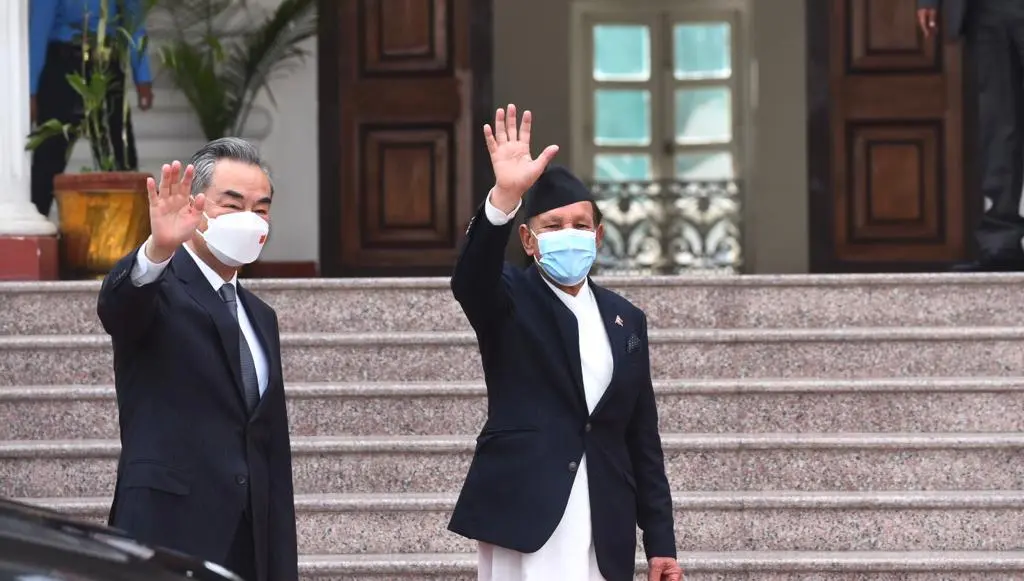Nepal is set to seek deals with China outside the framework of Beijing’s ambitious Belt and Road Initiative (BRI) next week during foreign minister Narayan Khadka’s visit to Qingdao next week.
Khadka is heading to the coastal city to meet with Chinese foreign minister Wang Yi next week, Nepal’s foreign ministry announced on Friday.
According to sources privy to this development, Nepal has taken this visit, which begins on August 10, as a fresh opportunity to discuss the ways to implement bilateral agreements that were reached between the two governments when Wang visited Nepal in late March.
Nepal and China had then signed nine cooperation agreements focusing on cross-border railway, COVID-19 vaccines and economic and technical cooperation. However, during Wang's visit, Nepal snubbed China by asking not to make specific deals on the ambitious Belt and Road Initiative saying that the country needs more negotiations for the same.
"This will be a reciprocal visit by our side. It will give an opportunity to discuss the ways to implement bilateral agreements," a senior official at Nepal's foreign ministry told India Narrative.
Even as Beijing has been asking Kathmandu to give a list of viable projects that can be built with loans under BRI, the government led by Sher Bahadur Deuba has conveyed several times in recent months that it needs only grants not commercial loans under the BRI for developing infrastructures, owing to the fear that it may slip into into a debt trap like another South Asian neighbour Sri Lanka.
CCP trying to cultivate ties with Nepali Congress
Apart from bilateral issues, the Nepali foreign minister will also discuss the party-to-party ties between the Chinese Communist Party (CCP) and the Nepali Congress Party that began when late BP Koirala, a founding veteran leader, was at the helm of the party in the late 1950s.
On behalf of his party, Khadka has been engaging with the CCP at the party level for the past couple of years.
The announcement of foreign minister's visit to China comes a day after the Nepali government formally decided to hold general and provincial elections on November 20.
China, which expressed its desire to see an alliance among the communist forces in the upcoming elections, is also trying to cultivate its ties with the Nepali Congress, the chief ruling party of Nepal, sources said.
As the possibility of electoral alliance among the communist parties is now fading, the CCP is now trying to cultivate ties with the Nepali Congress party, which of late, is tilting towards the United States.
A senior leader of the CCP, Liu Jianchao, who visited Kathmandu from June 10 to 13, sought to build stronger ties with the Nepali Congress when he met Prime Minister Sher Bahadur Deuba, who is also the president of the chief ruling party.
China seeks Nepal's support over Taiwan issue
The visit of Nepali foreign minister will take place at a time when China has been trying to drum up support for its position on the Taiwan issue which flared up after the recent unannounced visit of US House Speaker Nancy Pelosi to the self-ruled island earlier this week.
In a press release on August 3, Chinese Ambassador to Nepal Hou Yanqi sought support on the Taiwan issue, recalling the country's long-standing One-China policy.
"China and Nepal are good neighbours, trustworthy friends and reliable partners linked by mountains and rivers. The two countries have always understood and supported each other on issues of core interests concerning respective sovereignty, security and territorial integrity," she said.
The ambassador also appreciated Nepal’s longstanding commitment to the one-China principle and resolute opposition to “Taiwan Independence”.
"It is also the political foundation of China-Nepal relations. We believe that the government of Nepal and its people will continue to abide by the one-China principle and understand and support China’s legitimate and justified position and work together with China to defend each other’s sovereignty, security and territorial integrity," she stated.
China appreciates Nepal's longstanding commitment to 'one-China principle' and resolute opposition to "Taiwan independence".https://t.co/pQjXjDtJeT
— Spokesperson Of Chinese Embassy In Nepal (@PRCSpoxNepal) August 3, 2022
Two days after the ambassador's statement, Nepal on Friday said that it was committed to One-China policy.
"We are closely following the evolving situation in the Taiwan Straits. Nepal has always been upholding One China Policy. Nepal and China have been respecting each other's sovereignty, territorial integrity, and national independence," Sewa Lamshal, a spokesperson for the foreign ministry told a media briefing. She also stated that as a peace-loving country, Nepal is in favour of continued peace and stability in the Taiwan region.
The Chinese ambassador also met Nepal's home minister Balkrishna Khad on Friday itself during which the latter also expressed Nepal's commitment to One-China policy, according to a statement issued by the home minister's secretariat.
Nepal walks a tightrope amid growing US-China rivalry
The visit of Nepali foreign minister's visit to China has also a geopolitical dimension. It is taking place at a time when US-China rivalry has heightened Nepal in recent months after Nepali parliament passed the Millennium Challenge Corporation (MCC) Compact, a $500 million infrastructure and economic development grant from the US government, in February. China and the US engaged in a war of words over the MCC Nepal Compact accusing each other of violating Nepal's sovereign decision.
China's Ministry of Foreign Affairs accused the US of employing coercive diplomacy against Nepal while the US countered that it was China who was behind the delay in passing the US grant programme MCC.
Most recently in June, China also welcomed Nepal's decision to back away from the State Partnership Program (SPP) of the US government. According to officials, Nepal believed that the programme was an integral part of the US Indo-Pacific Strategy brought to contain China military.
Also Read: Top US official meets political leadership in Kathmandu amid Chinese inroads




















